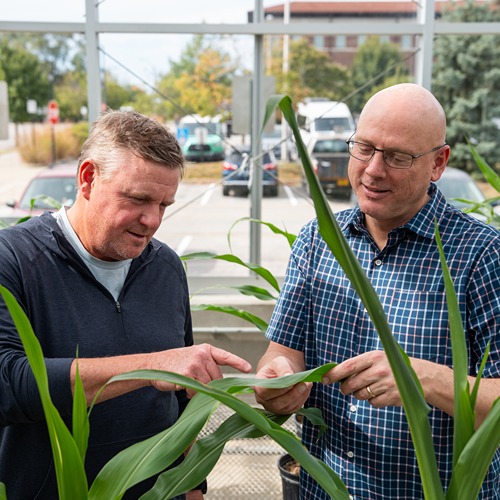Butcher Block adds eggs from chickens fed orange corn
The Boilermaker Butcher Block’s selections will now include farm fresh eggs laid by Purdue chickens that are fed orange corn.
Orange corn is a nutritionally enhanced type of corn developed by Purdue Agronomy Professor Torbert Rocheford as part of an international humanitarian effort aimed at addressing malnutrition globally. Since 2017, Rocheford’s startup company NutraMaize has worked closely with Purdue Animal Sciences to demonstrate the benefits of orange corn for poultry.
A team of researchers, including Rocheford and Darrin Karcher, associate professor of animal sciences, have found orange corn to have some benefits, such as having more antioxidant carotenoids, which are associated with darker, richer yolks and reducing the risk of age-related macular degeneration. Additional research from Purdue’s Agronomy and Animal Sciences departments and NutraMaize found that orange corn produces healthier hens.
 The eggs from chickens fed orange corn tend to have dark orange yolks. This high color pigmentation comes from an increased amount of carotenoids that get transferred to the eggs from the chickens' diets.
The eggs from chickens fed orange corn tend to have dark orange yolks. This high color pigmentation comes from an increased amount of carotenoids that get transferred to the eggs from the chickens' diets. “We decided to sell the eggs because of the introduction of orange corn,” poultry unit manager Jason Fields said. “We thought it would be a way to introduce a product that nobody else had. We have a lot of pride in our birds and in the programs that we're doing.”
Nearly every part of the egg production process takes place on campus.
“The orange corn is grown at the Agronomy Center for Research and Education (ACRE),” Emily Ford, manager of the Butcher Block, explained. “The chickens are raised at the Animal Sciences Research and Education Center (ASREC) farms. The eggs are washed and packaged at the farms. Then, we sell the eggs at the Butcher Block. It’s Purdue farm to fork.”
Fields said, “It's great that we can provide food to people under the Purdue name, but it’s also another way that we can educate our consumers about the food and where it comes from.”
The Butcher Block’s retail area will begin offering the eggs on April 3 for $6 a dozen, with the proceeds helping to support the Butcher Block’s educational mission. The eggs will also be sold at Spring Fest this year.
In the future, the Butcher Block plans to get students involved in the egg production. “We want to get all hands-on deck,” said Ford. “We want to expose interested students to the process. Initially, however, we want to have a good idea of the process before we extend that knowledge to students.”






